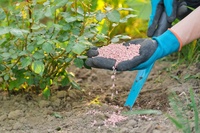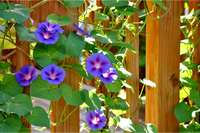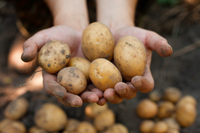These water-saving solutions for your garden will help you to use less water while keeping your garden looking great. With longer and drier summers plus hosepipe bans in many areas, it is important to plan your garden appropriately, so your plants will cope with the changing climate. There are many ways to save water, even in smaller spaces, and when your garden needs water most, you will be ready to help quench your plant's thirst.

1. Rainwater harvesting
There are many waterbutts and containers available in many sizes designed to fit into all size spaces, even on patios and balconies. They can be situated so water will run off the guttering from your shed, home, or greenhouse. Some will stand on the ground; others can be mounted on the wall. Finding recycled containers is another way to harvest rainwater and fill it up over the rainy months to be used to water your plants during dry weather.
2. Mulching
Mulching your beds, borders, and containers is one of the best ways to retain moisture in the soil. If you mulch with good quality organic mulch such as homemade compost, leaf mulch, well-rotted manure, or similar, not only will you be helping to preserve moisture but also feeding your plants. Mulch can also be pebbles/stones, grass/straw, or wood chip.
3. Water timings
If you water your plants in the heat, the water will soon evaporate before the roots are even able to enjoy the drink. Watering in the morning or evening is best for giving plants enough time to absorb what they need. Water the roots and soil around the plants, and avoid watering the foliage.
4. Right plant, right place
First, planting with what is best for your plants and garden in mind is the way to approach gardening—thinking about growing native plants, plants that will do well in your soil type, creating a dry garden, and planting what will thrive in each area.
5. Mow your lawn on a high setting
Mowing your lawn on a higher setting makes a big impact on the water needs for your property. Mowing the grass higher means the roots sink deeper where there is more moisture, and therefore you won't need to water so often. Also, if there is a long, dry summer and your lawn is scorched, it hasn't died! Leave it, don't waste water, and it will soon spring back to green when the rain comes again.
For help with watering requirements for your garden, visit us in store.




